Drupal is a powerful and flexible content management system (CMS) that developers, large organizations, universities, and government portals prefer for its scalability, modularity, and strong security. To get the most out of Drupal, choosing the right hosting environment is essential. While generic shared hosting may work for basic websites, Drupal’s dynamic structure and PHP-heavy backend need optimized infrastructure, especially for larger or more interactive applications.
This guide will cover everything you need to know about Drupal hosting, including its importance, performance needs, types of hosting environments, and security requirements. It will also list the top Drupal hosting providers for 2025.
Why Drupal Hosting Matters
Drupal is not a lightweight CMS. Unlike platforms like WordPress that often work on any standard LAMP stack, Drupal sites need more specialized resources to operate efficiently. Its modular design, heavy reliance on custom themes, and extensive use of databases for generating dynamic content all increase the demands on the server.
- Choosing a hosting provider optimized for Drupal can lead to:
- Faster load times through caching layers designed for Drupal.
- Better compatibility with PHP libraries and Drupal core dependencies.
- Easier installation of modules, updates, and version rollbacks.
- Improved security tools that fit well with Drupal’s architecture.
- Support staff who are knowledgeable about Drupal-specific performance issues.
Picking the right hosting partner can make the difference between a slow, unstable website and one that is fast, secure, and able to grow.
Core Requirements for Drupal Hosting
To run a Drupal website effectively, the hosting environment should meet or exceed these technical specifications:
- PHP Version: Drupal 10 requires PHP 8.1 or higher. Choose hosting that supports multiple PHP versions.
- Database Support: MySQL 5.7+ or MariaDB 10.3+. PostgreSQL and SQLite are also supported but are less common in production.
- Web Server: Apache or NGINX is preferred, while Litespeed is also compatible if configured properly.
- Memory: At least 512MB for smaller sites. For production environments, 1GB+ is recommended.
- SSH and Git Access: Developers need command-line tools for installing modules, updates, and controlling versions.
- Composer Support: Composer is essential for managing PHP dependencies in modern Drupal versions.
Your hosting solution should meet these minimums while also providing scalability and tools to improve long-term maintenance and performance.
Shared vs VPS vs Dedicated Hosting for Drupal
There are several types of hosting available for Drupal, each with its own benefits and drawbacks based on your site’s size, complexity, and expected traffic.
Shared Hosting
Shared hosting is the most affordable option and works well for small Drupal websites, blogs, or portfolios. However, performance can be erratic due to sharing resources with other users on the server. Many shared hosts offer one-click Drupal installations, but may lack the developer tools, caching, and memory allocation that larger sites need.
VPS Hosting
Virtual private servers, or VPS, offer a compromise between dedicated and shared hosting. You receive isolated resources such as CPU, RAM, and disk space, resulting in better reliability and performance. VPS plans are suitable for medium-sized Drupal websites, staging environments, or applications that need root access and custom setups. Managed VPS plans also take care of server maintenance for you.
Dedicated Hosting
Dedicated servers are ideal for large Drupal sites with high traffic, complex caching requirements, or critical uptime needs. You have complete control over server configuration, operating system, security settings, and software stack. While these environments are more expensive, they provide unmatched performance and flexibility.
List of Best Drupal Hosting Providers
1. SiteGround
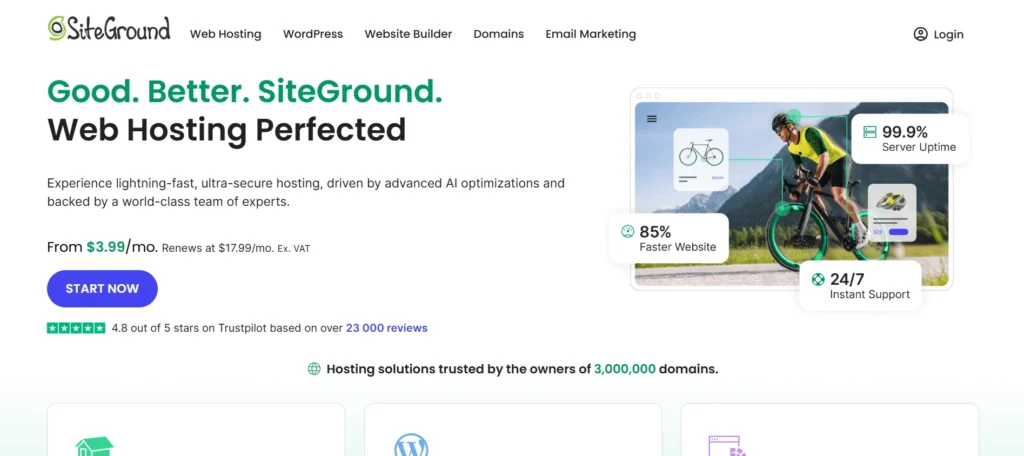
SiteGround is a reliable and high-performing hosting provider known for its fully managed Drupal hosting. Powered by Google Cloud infrastructure, it offers excellent uptime, fast page loading, and improved scalability. This makes it a great choice for developers, businesses, and agencies running content-heavy Drupal websites.
The platform includes its SuperCacher technology, which significantly enhances Drupal performance by caching dynamic pages, objects, and databases. It also provides free SSL, daily automated backups, built-in Cloudflare CDN, and proactive security monitoring. With a one-click Drupal installer and tools like SSH and Git integration, SiteGround creates a streamlined experience for both beginners and advanced users. Its customer assistance is knowledgeable about Drupal and available 24/7 via live chat and tickets.
Features:
- Google Cloud infrastructure with SuperCacher
- Daily backups, SSL, CDN, and proactive security
- Developer tools: SSH, Git, staging
- One-click Drupal install via Site Tools
- High-speed performance and 99.9% uptime
Pricing:
- Starts at $2.99/month (StartUp Plan)
2. A2 Hosting
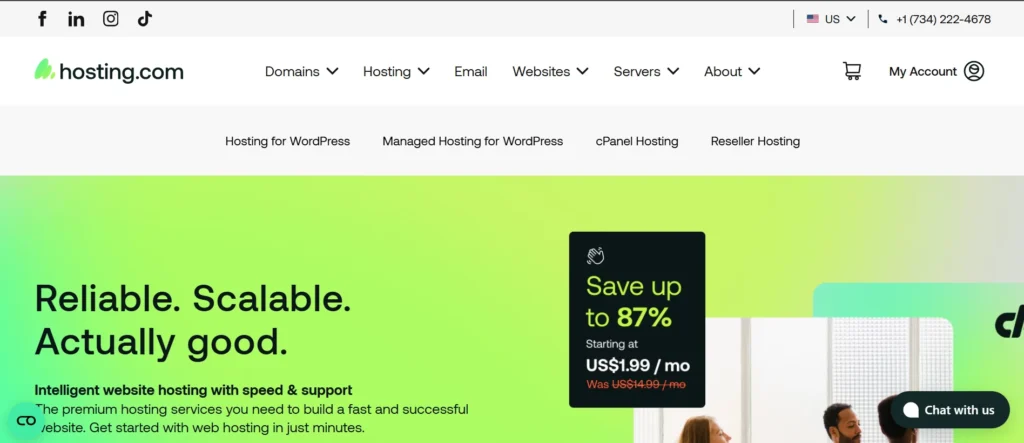
A2 Hosting prioritizes speed. It offers Drupal-optimized hosting on Turbo Servers, which load pages up to 20 times faster than standard environments. This makes it ideal for developers and site owners seeking high performance. A2 Hosting uses NVMe SSDs, HTTP/3, QUIC, and built-in caching layers (OPcache, APC, Memcached) to optimize delivery for Drupal.
It supports multiple PHP versions, SSH, Git, and staging environments. The Softaculous installer simplifies the Drupal setup process, while features like DDoS protection, a 99.9% uptime commitment, and global data centers work together to ensure stability and security. Developers appreciate its performance tuning and server customization.
Features:
- Turbo Servers with NVMe SSD storage
- HTTP/3 and caching stack (APC, OPcache)
- SSH, Git, and multiple PHP versions
- One-click Drupal installation via Softaculous
- ree SSL, CDN, and DDoS protection
Pricing:
- Starts at $2.99/month; Turbo Boost from $6.99/month
3. Cloudways
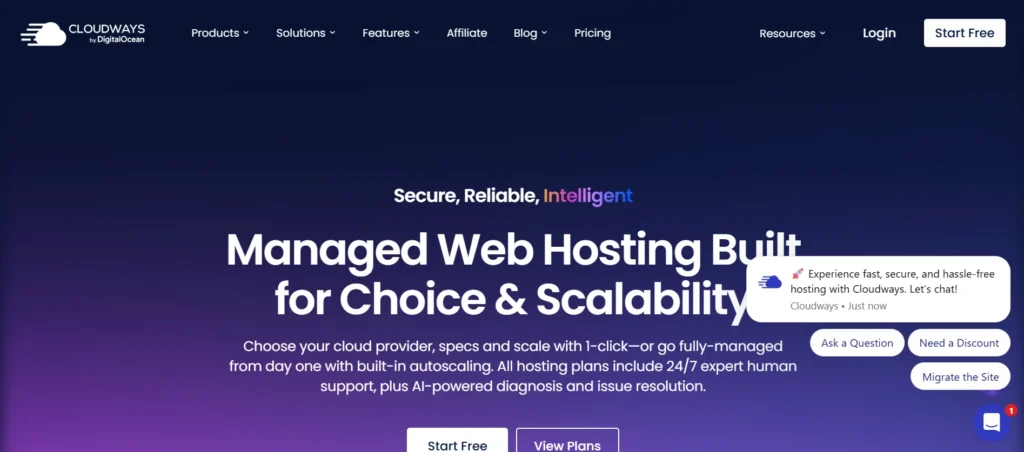
Cloudways provides flexible, cloud-based managed hosting for Drupal users who need high performance, scalability, and control. Built on major cloud providers like AWS, DigitalOcean, Linode, Vultr, and Google Cloud, it allows you to choose your infrastructure and scale resources easily. The platform is designed for developers and offers advanced caching with Varnish, Memcached, Redis, and NGINX for optimal performance.
Other features include automated backups, Git deployment, SSH/SFTP access, staging environments, and real-time monitoring with New Relic. Cloudways is perfect for agencies, freelancers, and development teams managing multiple client sites.
Features:
- Supports AWS, GCP, DO, Linode, Vultr
- Advanced stack: NGINX, Redis, Varnish, Memcached
- Real-time performance monitoring
- Staging, cloning, and team collaboration
- Managed firewall and automatic scaling
Pricing:
- Starts at $14/month (1 GB RAM DigitalOcean server)
4. GreenGeeks

GreenGeeks combines solid Drupal performance with a strong commitment to environmental sustainability. Every hosting plan offsets energy use with 300% wind energy credits, making it one of the most eco-friendly web hosts available. From a technical perspective, it uses LiteSpeed web servers, built-in LSCache for Drupal, and HTTP/3 for performance.
Developers benefit from SSH access, Git, WP-CLI, and multiple PHP versions. GreenGeeks also offers real-time security monitoring, nightly backups, and free CDN integration. This makes it a great option for nonprofits, eco-conscious brands, and personal websites that value green practices without sacrificing speed or reliability.
Features:
- Eco-friendly: 300% renewable energy match
- LiteSpeed servers with LSCache for Drupal
- Free daily backups, CDN, and SSL
- SSH, Git, and PHP version control
- Supports Drupal 9 and 10 installations
Pricing:
- Starts at $2.95/month (EcoSite Lite Plan)
5. InMotion Hosting

InMotion Hosting is a developer-focused hosting company that offers strong infrastructure for Drupal sites. Its custom UltraStack platform uses NGINX, Brotli compression, and PHP-FPM to improve page loading times and server response. All plans come with SSD storage, malware protection, and automated backups. Developers can access SSH, Git, WP-CLI, and staging environments.
Business owners benefit from free migrations, 24/7 U.S.-based support, and marketing tools. The platform easily scales from shared hosting to VPS and dedicated environments, making it suitable for both small sites and large Drupal applications.
Features:
- UltraStack with NGINX and Brotli compression
- Free SSL, backups, and malware defense
- Developer tools: SSH, Git, staging
- Drupal-optimized server configurations
- 99.9% uptime and U.S.-based support
Pricing:
- Starts at $2.29/month (Shared Core Plan)
- VPS from $14.99/month
6. Bluehost

Bluehost is a beginner-friendly hosting provider officially recommended by WordPress that is also fully compatible with Drupal. It offers an easy one-click installation process for Drupal through its cPanel interface and provides essential tools like SSH access, MySQL database support, and free domain registration with the initial plan.
Bluehost’s infrastructure includes SSD storage, custom security layers, and integration with Cloudflare CDN for better performance. It’s particularly suited for small businesses and personal projects that require reliable uptime and a user-friendly dashboard. While it may not focus as much on developers as other platforms, Bluehost remains a solid entry-level option for Drupal hosting.
Features:
- Free domain name for the first year
- One-click Drupal installer via cPanel
- SSD storage and Cloudflare CDN integration
- SSH access and database management
- 24/7 live chat and phone support
Pricing:
- Starts at $2.95/month (Basic Shared Hosting)
7. Hostinger
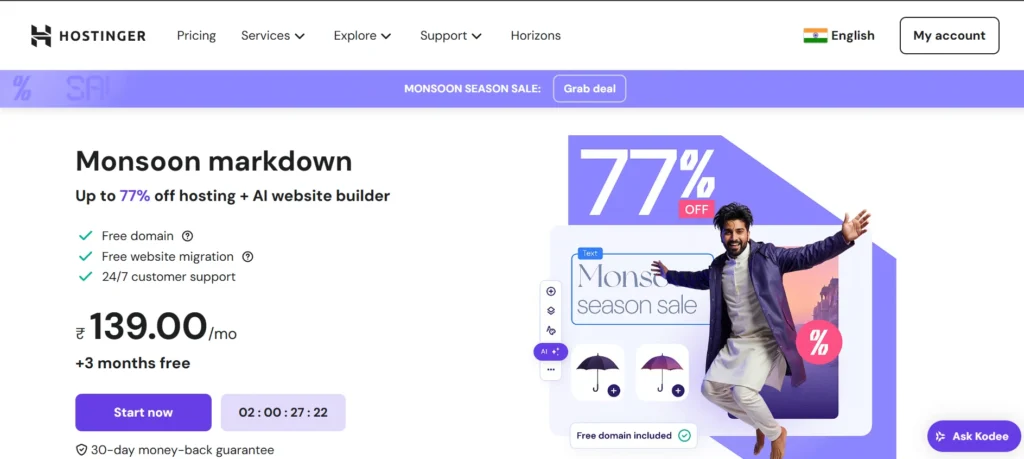
Hostinger offers robust Drupal hosting at an affordable price, making it a good fit for startups and freelance developers. Its infrastructure features LiteSpeed servers, full SSD storage, and a custom control panel that simplifies management. Hostinger also includes built-in security measures such as DDoS protection, automatic updates, and a malware scanner.
The auto-installer supports Drupal versions 7, 8, 9, and 10, ensuring broad compatibility. Despite its low cost, Hostinger maintains good performance and features, offering a developer-friendly experience with PHP version control, GIT, and SSH access.
Features:
- LiteSpeed cache and SSD-powered servers
- Auto-installer for all major Drupal versions
- DDoS protection and automatic updates
- SSH, Git, and cron job support
- Multi-tier caching for faster site loading
Pricing:
- Starts at $2.49/month (Premium Web Hosting)
8. Nexcess (by Liquid Web)
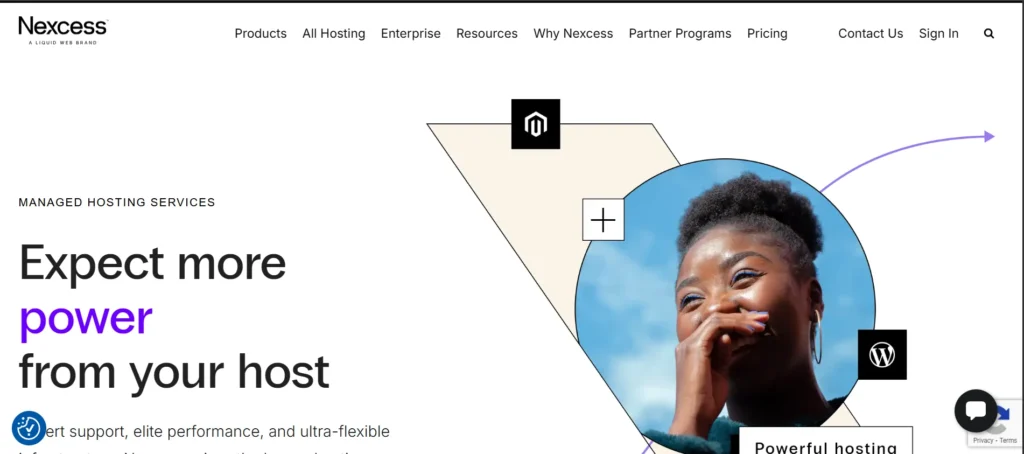
Nexcess provides a powerful managed hosting solution for Drupal websites, especially for high-traffic sites and agencies with client projects. Built on a cloud infrastructure tailored for content-heavy CMS platforms, Nexcess features auto-scaling, built-in CDN, and advanced caching with Redis, Varnish, and NGINX.
Its hosting stack is optimized for PHP-based apps like Drupal, and users receive a dedicated staging environment, daily backups, and proactive monitoring. Development tools like Git, SSH, and Composer support make it a strong choice for professional teams.
Features:
- Managed cloud hosting with auto-scaling
- Varnish, Redis, and NGINX-based performance stack
- Free daily backups, CDN, and SSL
- Git, SSH, and staging environments
- Developer-friendly PHP and database tuning
Pricing:
- Starts at $21/month
9. FastComet
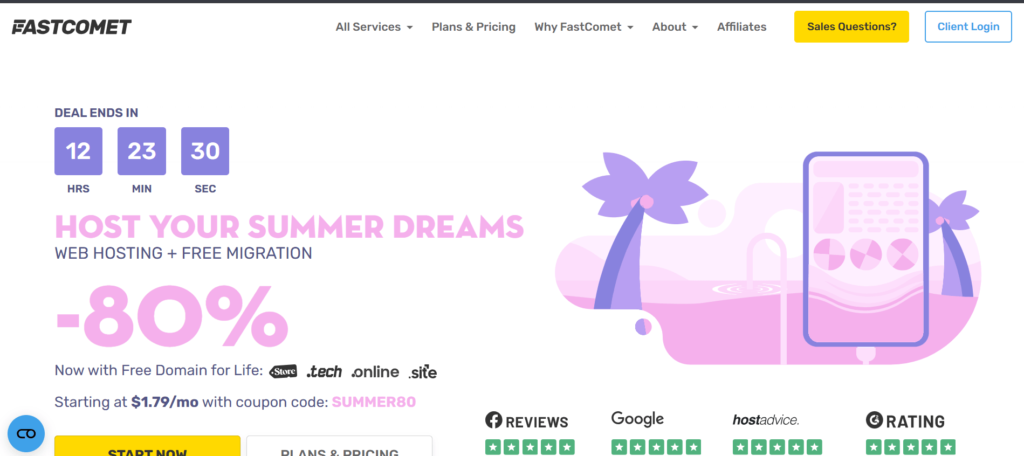
FastComet offers Drupal hosting with a global presence, supported by 11 data center locations and a Cloudflare-powered CDN. It ensures excellent performance for audiences worldwide and comes with cPanel management, SSD storage, and RocketBooster optimization tailored for CMSs like Drupal.
FastComet includes daily backups, firewall protection, and malware scanning, all included in its plans at no additional cost. The platform is suitable for small to medium-sized websites, especially those needing global reach. One-click Drupal installation and regular security updates make it easy to maintain a secure and fast site.
Features:
- 11 global data centers and Cloudflare CDN
- SSD storage with RocketBooster optimization
- Daily backups, malware scanning, and firewalls
- cPanel management and Softaculous Drupal install
- Free site transfers and domain
Pricing:
- Starts at $2.19/month (FastCloud Plan)
10. DreamHost
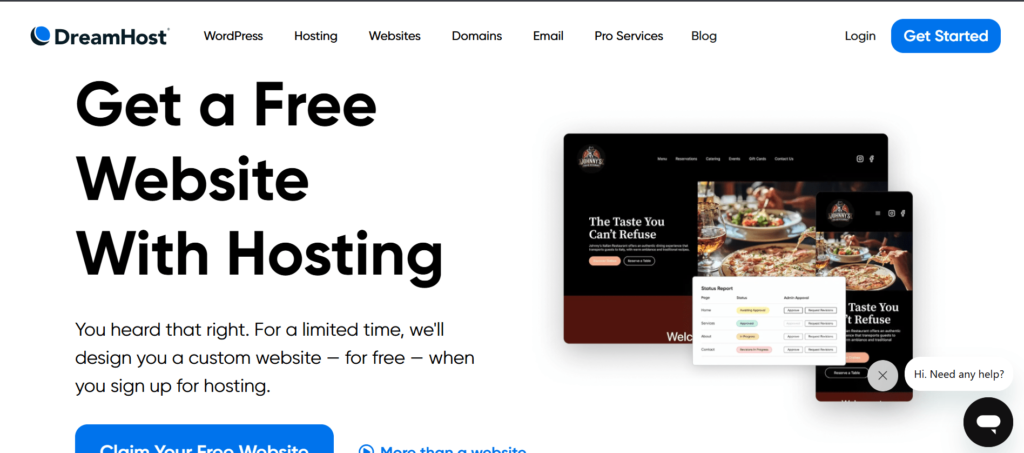
DreamHost provides a solid, open-source-friendly hosting environment for Drupal developers. It’s known for its focus on privacy and performance, offering unlimited bandwidth, SSD storage, and free SSL with all plans. The custom control panel is user-friendly, and advanced users can benefit from SSH, Git, and automatic backups support.
While DreamHost does not use cPanel, its dashboard is clean and targeted at developers. It also supports Drupal-specific caching and guarantees 100% uptime on its VPS and cloud hosting solutions.
Features:
- SSD storage and unlimited bandwidth
- SSH and Git access for developers
- One-click Drupal install and automatic updates
- Free SSL and custom control panel
- 100% uptime guarantee on advanced plans
Pricing:
- Starts at $2.59/month (Shared Starter
- VPS from $10/month
11. ScalaHosting
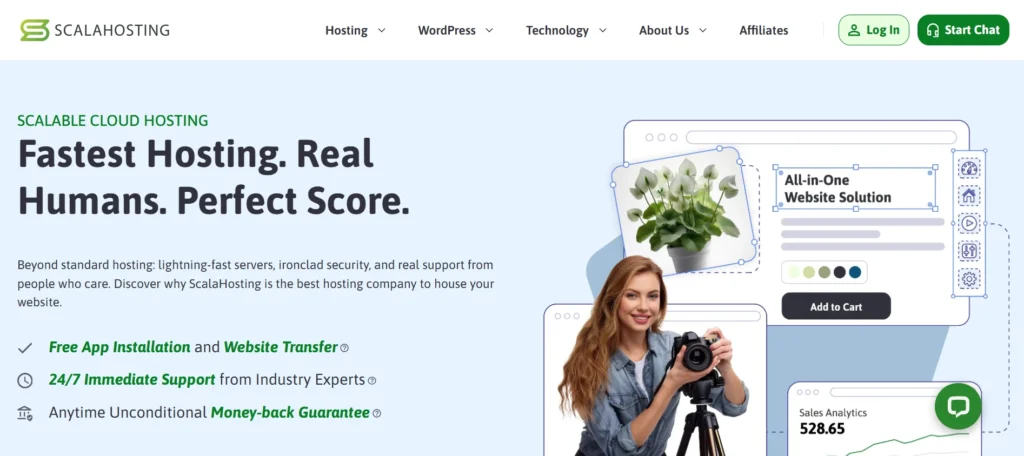
ScalaHosting creates a modern, developer-focused environment for hosting Drupal websites, particularly with its Managed VPS plans. It includes its control panel called SPanel, which works well with cPanel but without the licensing fees. With SSD storage, automatic updates, daily backups, and built-in SShield security for malware protection, ScalaHosting delivers excellent performance and peace of mind.
Its cloud VPS plans are fully scalable and provide dedicated resources, making it perfect for growing Drupal sites with dynamic content or traffic spikes. Developer tools like SSH, Git, and advanced caching are also part of the offer.
Features:
- SSD storage and managed VPS infrastructure
- SPanel (cPanel alternative) with full Drupal support
- Daily backups and malware scanning via SShield
- One-click Drupal installation and auto-updates
- Root access, Git, SSH, and staging tools
Pricing:
- Shared hosting starts at $2.95/month
- Managed VPS starts at $14.95/month
12. Pantheon
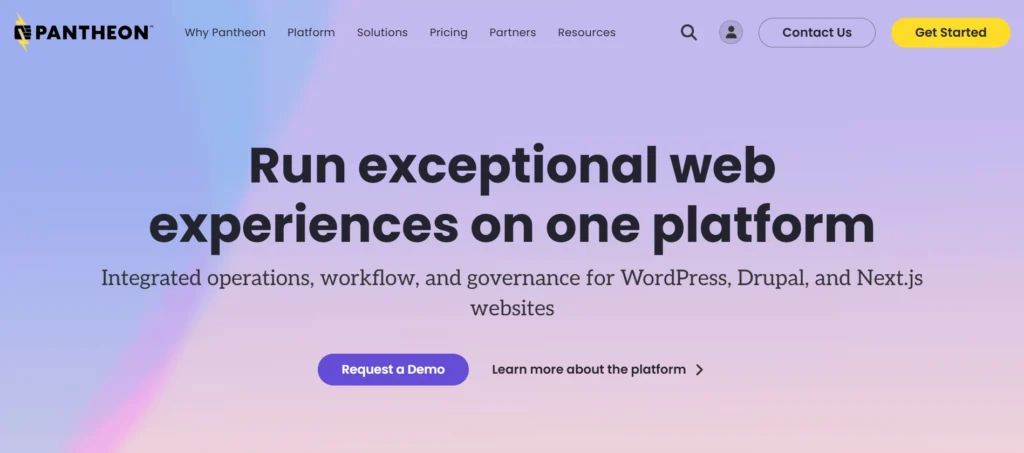
Pantheon is a premium, developer-centric hosting Pantheon has a container-based design with an advanced Dev/Test/Live workflow structure, in contrast to conventional shared hosting companies. This means every site comes with three environments by default—allowing for safe development, staging, and deployment processes.
It’s especially favored by web development agencies, enterprise teams, universities, and government bodies managing large-scale Drupal infrastructures.Pantheon’s infrastructure runs on high-availability cloud architecture and is backed by a global CDN, automated backups, Redis object caching, and New Relic monitoring. The platform is tightly integrated with Git, enabling continuous delivery workflows and version-controlled deployments.
Developers gain full command-line access, secure SFTP, and support for Composer-based Drupal projects, making it ideal for modern development practices. Furthermore, Pantheon offers robust security features, role-based access control, and disaster recovery options for mission-critical applications. Whether you’re building a multi-region university portal or managing dozens of client sites under one organization, Pantheon is designed to scale effortlessly and maintain peak performance under pressure.
Features:
- Dev/Test/Live Git-based development workflow
- High-availability container infrastructure
- Global CDN, Redis caching, and automated backups
- New Relic performance monitoring and SFTP/SSH access
- Team management with granular roles and permissions
Pricing:
- Starts at $41/month (Basic Plan)
13. Kamatera
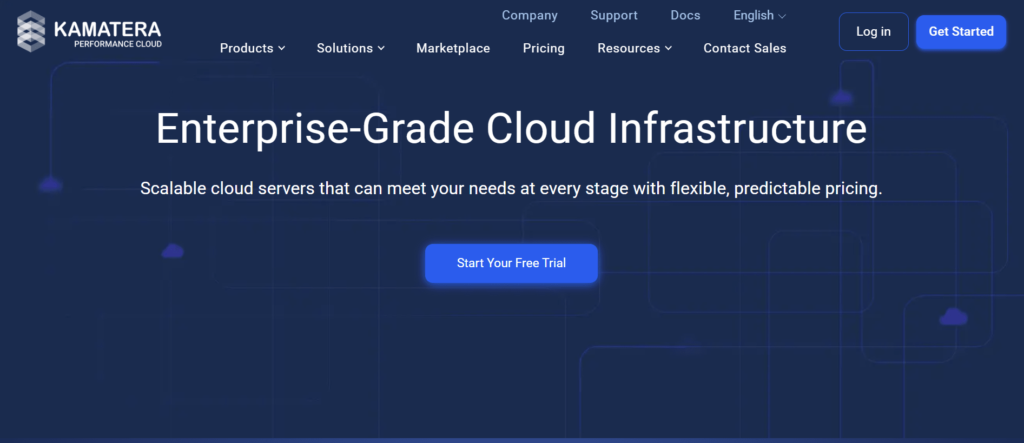
Kamatera is a global cloud infrastructure provider that offers highly customizable virtual servers, ideal for developers and system administrators who want granular control over their Drupal hosting environment. Unlike traditional shared hosting or managed solutions, Kamatera gives you raw cloud VPS and dedicated cloud server options that you can tailor to fit your exact performance, memory, and storage requirements.
It’s especially suitable for agencies managing multiple Drupal sites or enterprises running resource-intensive Drupal applications.With data centers in North America, Europe, Asia, and the Middle East, Kamatera delivers ultra-low latency and worldwide performance coverage. Users can choose from a range of OS templates—including pre-installed Drupal environments—or set up their own stack from scratch. Kamatera’s web-based control panel enables instant scaling, daily backup management, load balancing, and real-time server monitoring.
The platform also offers firewall configurations, DDoS protection, and root SSH access, making it ideal for secure and mission-critical Drupal deployments.Although it’s not a beginner-friendly solution, Kamatera is a powerful choice for tech-savvy users who prefer a cloud IaaS environment where every aspect of the server—from CPU count to geographic location—is in their hands.
Features:
- Fully customizable cloud VPS with root access
- Option to pre-install Drupal or build custom stacks
- 13 global data centers for low-latency performance
- Real-time scaling, monitoring, and backups
- Advanced security with private networks and firewalls
Pricing:
- Starts at $4/month (for 1 vCPU, 1 GB RAM, SSD storage)
14. Acquia Cloud
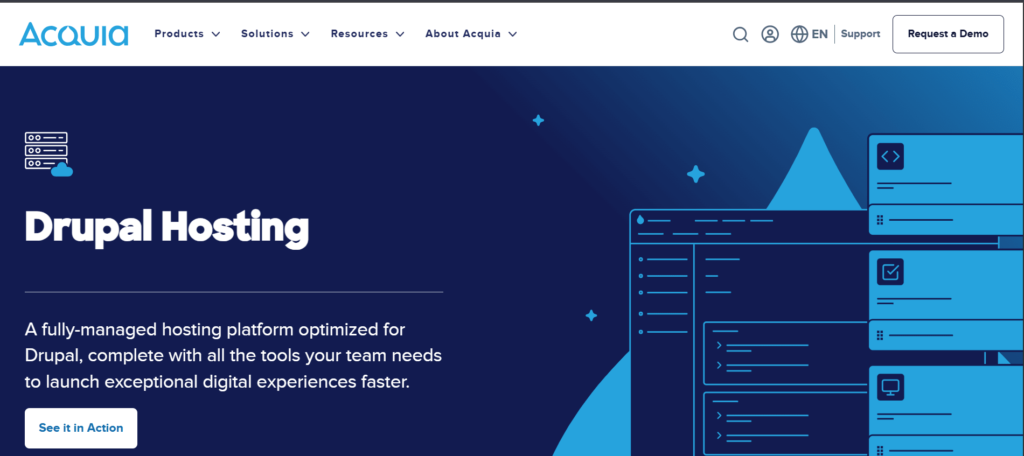
Dries Buytaert, the man behind Drupal, co-founded Acquia, a business that built the enterprise-grade Drupal hosting platform Acquia Cloud. Acquia Cloud is a robust, secure, and scalable infrastructure made specifically for Drupal apps that can support sophisticated digital experiences in sectors like government, healthcare, higher education, and large-scale commerce.Its platform is trusted by organizations that demand 24/7 uptime, strict compliance standards, and high-performance content delivery.
What sets Acquia Cloud apart is its deep Drupal integration. It offers a built-in Dev/Staging/Production workflow, Git-based version control, automated backups, and a visual interface for managing deployments. Developers benefit from features like Acquia Cloud IDE, automated testing pipelines, and tight Composer support for Drupal dependency management.
Acquia’s infrastructure runs on Amazon Web Services (AWS), providing elasticity, high availability, and global reach. Additionally, it comes with enterprise-level security features including DDoS protection, WAF, encryption at rest, and compliance with HIPAA, FedRAMP, and GDPR.
As part of the larger Acquia Digital Experience Platform (DXP), users also get access to personalization tools, marketing automation, and headless CMS capabilities —making Acquia Cloud not just a hosting provider but a full digital experience engine for Drupal sites.
Features:
- Drupal-native platform co-founded by the creator of Drupal
- Dev/Stage/Prod environments with automated CI/CD
- AWS-powered scalable infrastructure with high availability
- Advanced security, WAF, and compliance certifications
- Access to Acquia’s DXP tools: personalization, headless CMS, and marketing automation
Pricing:
- Custom — varies by usage, site complexity, and support level
15. HostPapa
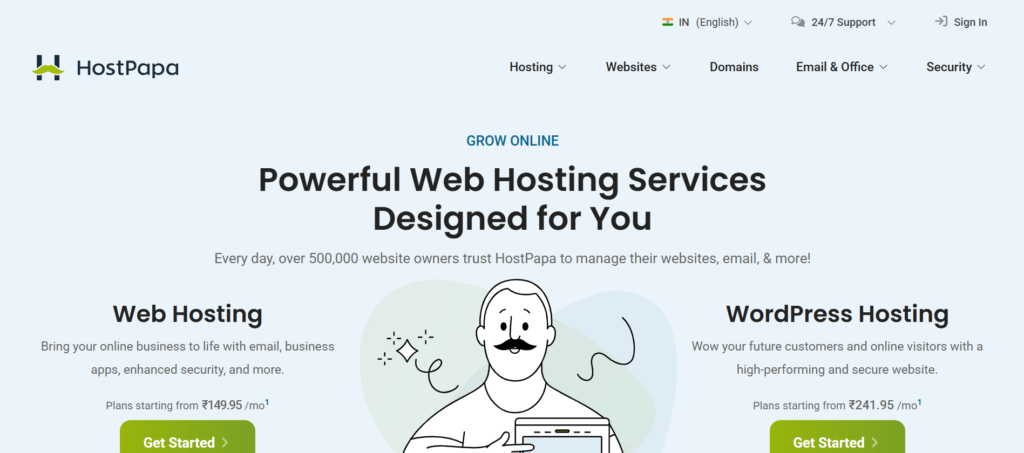
HostPapa is a Canadian-based web hosting company that offers affordable and beginner-friendly Drupal hosting for small businesses, bloggers, and entrepreneurs. Known for its commitment to green energy and customer-centric service, HostPapa delivers shared, VPS, and reseller hosting solutions that are optimized for content management systems like Drupal. It is particularly appealing to users who want a simple setup process, solid support, and good performance at a reasonable price point.
For Drupal users, HostPapa provides 1-click installation via Softaculous, along with features like free SSL, cPanel access, unlimited bandwidth, and SSD storage to ensure faster page loading. Their business-class plans also include enhanced server resources, priority support, and advanced email solutions.
HostPapa’s servers are hosted in SSAE 16 Type II certified data centers with high uptime guarantees, and users benefit from strong security features such as firewalls, intrusion detection, and malware scanning. While it may not offer the deep developer workflows of enterprise platforms, HostPapa is a reliable, low-barrier option for launching and managing Drupal websites, especially for SMBs or personal projects.
Features:
- One-click Drupal installation via Softaculous
- SSD storage and free SSL certificates
- Unlimited bandwidth and scalable resources
- cPanel access with email and DNS controls
- Green energy-powered data centers with strong uptime
Pricing:
- Starts at $3.95/month (Starter shared hosting plan)
Sustainability and Eco-Friendly Hosting
By 2025, sustainability is essential—it’s a competitive edge. Many modern hosting providers offer eco-friendly infrastructure, matching or exceeding their energy use with renewable energy credits. If your brand values sustainability, consider:
- Hosting powered by wind, solar, or hydro energy.
- Carbon-neutral operations.
- Data centers with high Power Usage Effectiveness (PUE) ratings.
- Public disclosures on environmental responsibility.
Green hosting does not compromise performance. Providers like GreenGeeks and A2 Hosting combine eco-friendliness with modern performance and security features.
Conclusion
Drupal is a powerful platform, but its success heavily relies on the hosting environment. With the right Drupal hosting provider, you can achieve improved performance, tighter security, and a smoother development process. Whether you’re building a university portal, enterprise knowledge base, or busy media site, it’s vital to choose a host that supports Drupal’s unique design.
From caching strategies and managing PHP versions to automated backups and developer workflows, the features offered by the hosting provider can greatly influence your site’s potential. The companies listed here provide a wide range of solutions to fit every need, from small business websites to enterprise applications.
Now that you have the foundational knowledge and top options, you can choose a Drupal hosting service that fits your specific needs for growth, security, and performance in 2025.
FAQs
1. What is Drupal hosting?
Drupal hosting refers to web hosting services optimized specifically to run Drupal-based websites. These services typically include support for PHP, MySQL/MariaDB databases, one-click Drupal installation, performance tuning for CMS workloads, and compatibility with key Drupal modules and themes.
2. Do I need special hosting for Drupal?
While Drupal can run on any standard LAMP/LEMP stack, using a hosting provider optimized for Drupal ensures better performance, security, and compatibility. These hosts typically offer faster page load times, dedicated caching layers, and expert support for CMS-specific issues.
3. Can I install Drupal on shared hosting?
Yes, many shared hosting providers support Drupal installation. However, shared environments may have performance or security limitations for high-traffic Drupal sites. For larger or more dynamic websites, VPS or cloud hosting is often recommended.
4. Is managed Drupal hosting worth it?
Managed Drupal hosting is ideal for those who want to avoid server management tasks. It includes automatic updates, backups, security monitoring, and performance optimizations tailored for Drupal. Non-technical individuals or companies that value scalability and uptime will find it very helpful.
5. Can I use cPanel to manage my Drupal website?
Yes, many hosts offer cPanel for managing files, databases, and email. You can install Drupal using Softaculous (a 1-click installer available in cPanel) and use it to manage MySQL databases and PHP settings as well.

